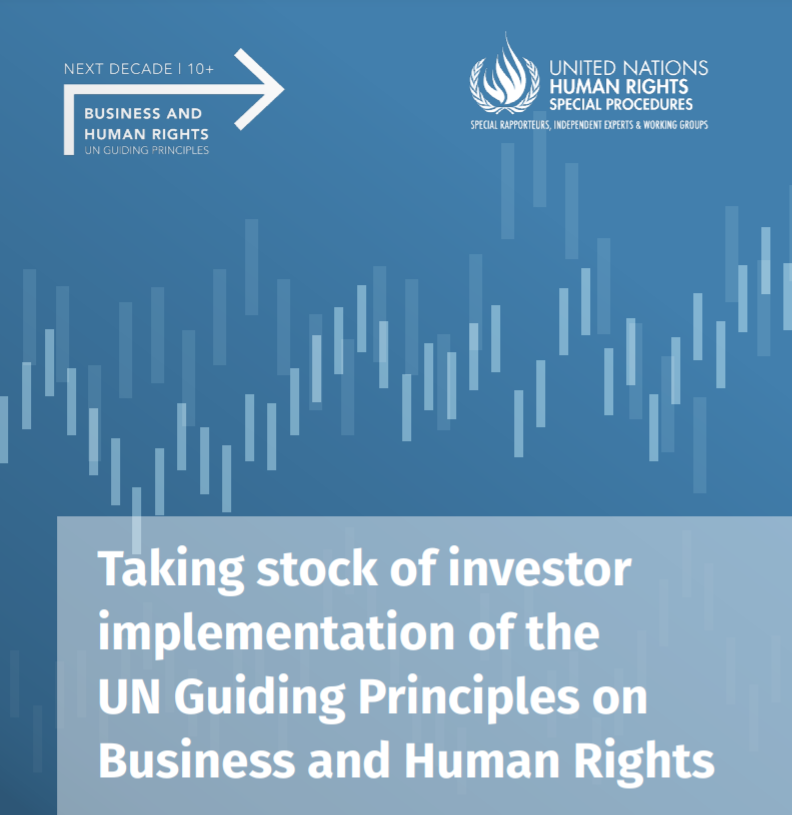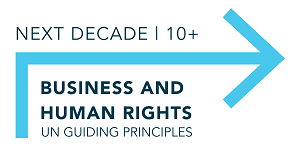Financial sector and human rights
Working Group on the issue of human rights and transnational corporations and other business enterprises
Context
Since its adoption in 2011, the Working Group on the issue of human rights and transnational corporations and other business enterprises have pronounced themselves on the applicability of the UN Guiding Principles on Business and Human Rights (UNGPs) to financial actors. In their considerations on the Thun Group of Banks discussion paper on the implications of UNGPs 13 and 17 on the banking sector, the Working Group have reaffirmed the responsibility of institutional investors and banks to avoid causing or contributing to negative impacts on human rights associated to their activities or business relationships. The Office of the UN High Commissioner for Human Rights (OHCHR) has also produced numerous resources to clarify how the UNGPs should be interpreted with respect to different financial actors.
The UNGPS 10+ Project: Financial sector tracks
In its efforts to assess the first decade of UNGPs implementation and develop a roadmap for meaningful action in the decade ahead, the UNGPs 10+ project recognizes the critical need to shine a brighter light on the role of the financial system in ensuring respect for human rights.

Financial sector actors play a vital role in the world’s economy, have substantial leverage over a range of other sectors and business activities, and are key for ensuring corporate respect for human rights at scale.
The UNGPs call on all businesses—including financial institutions—to ensure that, at a minimum, the full range of their activities respect the rights contained in the International Bill of Rights and the ILO Core Conventions.
Where financial institutions—public or private—may cause, contribute to, or be linked to negative impacts on people, they should uphold their human rights responsibilities by adopting and embedding relevant policies across the whole of their institutions and activities, conducting ongoing and iterative human rights due diligence, and playing a role in access to remedy, where appropriate.
As a means of driving more robust focus and practice in this important arena, the UNGPs 10+ project carried out targeted research and consultation in the key areas of:
- Institutional investment, including, but not limited to, asset management firms, public pension funds, trade union funds, foundations, endowments, and mutual funds
- Development finance, including, but not limited to, multilateral, bilateral, and national development finance institutions; microfinance institutions; community development financial institutions; and revolving loan funds

Commercial banks are also key financial actors in driving respect for human rights throughout economic activities. However, the Working Group has issued existing guidance in that area, and has prioritized development finance and institutional investment within the context of the UNGPs 10+ project.
The two project tracks resulted in a number of public outputs such as stocktaking reports, summary notes, strategic submissions to standard-setting processes, and position papers from the Working Group.
Institutional investors track outputs
- UNGPs 10+ project report, Taking stock of investor implementation of the UN Guiding Principles on Business and Human Rights | Executive summary
- Summary note: Virtual launch UNGPs 10+ stocktaking report on institutional investment (17 June 2021)
- Virtual workshop: The roles and responsibilities of public investment funds in implementing respect for human rights co-hosted with Norges Bank (10 November 2020)
- UNGPs 10+ and UN B-Tech dialogue on investment and human rights co-hosted with UN B-Tech (29 October, 2020)
- Working Group submission to PRI's draft human rights framework (21 September 2020)
Development finance track outputs
- Working Group letter to the French Development Agency (AFD) in its role of head convenor of Finance in Common, the "first global meeting of all public development banks" (6 October 2020)
- Working Group letter to the World Bank Group regarding the report and recommendations resulting from the external review of IFC and MIGA's environmental and social (E&S) accountability, including the CAO's role and effectiveness (11 September 2020)
- Working Group letter to the International Finance Corporation's Accountability Review to strengthen alignment with the UN Guiding Principles on Business and Human Rights (5 March 2020)
Informative Note on Finances and Human Rights in Latin America and the Caribbean
Currently, within the framework of the RBCLAC Project, the Working Group on Business and Human Rights is developing a study on “State, financial actors and human rights in Latin America and the Caribbean: progress and challenges in incorporating a human rights approach into financial policies, regulations and practices in the region”. The report will provide an analysis of financial standards, policies and practices from a business and human rights perspective, highlighting emerging practices, gaps and opportunities for improvement. In terms of the financial sectors covered, it will include public and private banks considering both their lending and project investment operations, and asset-owning institutional investors -such as pension funds- and asset managers, with special focus on mutual funds, private equity and venture capital funds. The report will not cover development finance institutions.
Call for inputs - Finance and Human Rights Study LAC
Deadline: 30 July 2022 (closed)
WORD | PDF
Other Working Group Documents on finance issues
Report of the Working Group on the issue of human rights and transnational corporations and other business enterprises on Human rights-compatible international investment agreements
Statement - Financial Sector and the European Union Corporate Sustainability Due Diligence Directive